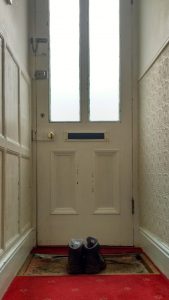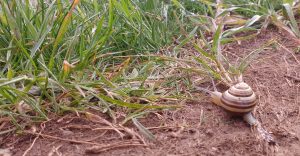I’m having a lovely time beginning to fill the bookshelves at what the afternoon knows.
A few posts ago I hit upon the happy idea of linking each post about a Thing with a poem (or sometimes even poems) which would then go into the wtak anthology. Pleasing, don’t you think? So I have today just put up a page about ‘Water’, the poem linked to the first post about thing 4. And I’m already excited about which poem is going to go with the next post. It’s like having access to a sweet shop, but one where the sweets only do you good. How marvellous is that? How can you resist? There’s not a huge range up there yet, but it is growing. Have a look!
The second post about thing 4, part two of the pilgrimage, will be with you in a few days. For the moment, I’ll just mention that I’m hoping to go and watch murmurations some time over the next few weeks or so, as one of my Things. Anyone want to join me?
 There must be some kind of equation for packing.
There must be some kind of equation for packing.
If N=number of things you’d like to take, C the number of things you feel you can carry, and P what you can actually fit in your pack, the initial relationship between N, C and P can be assumed to be something like N>C≥P. After that it gets a bit confusing; but the net result is definitely F, which is what you say when you pick it up for the fifteenth time that day and your shoulders are very, very angry.
I was off to Somerset for a two-day water pilgrimage from the Holy Well at Frome to Aquae Sulis, the springs which feed the baths in, well, Bath. (more…)
 I’m very pleased to be able to say that info. about the first one-day workshop is now up on the site.
I’m very pleased to be able to say that info. about the first one-day workshop is now up on the site.
I’m getting the chance to work with Simon Davies, late of Dove Cottage, and it’s a such a treat to be plotting and planning together. We had a lovely day yesterday, talking excitedly, eating slightly too much, getting breadcrumbs on the many books of poems which got pulled off the shelves, and generally having ourselves a great time. We are really looking forward to working with whoever turns up and whatever they bring. Do nip over to harvest and seed-time and have a look. One of those people might be you!
 I’m just about to set off to do thing 4, and I’ll be writing about thing 3 on the train—so much to do, so many things to wonder about! But this is a quick post to let you know that on the events/workshop pages here at what the afternoon knows there is now information about the first of this year’s events: the workshop series I’m facilitating with Hazel Clarke, the Senior Guide from Dove Cottage. I imagine that sooner or later this will feature as one of the things, as I love this work so much; but in the meantime you can find out more about it here: the way we live now: understanding today, reimagining tomorrow.
I’m just about to set off to do thing 4, and I’ll be writing about thing 3 on the train—so much to do, so many things to wonder about! But this is a quick post to let you know that on the events/workshop pages here at what the afternoon knows there is now information about the first of this year’s events: the workshop series I’m facilitating with Hazel Clarke, the Senior Guide from Dove Cottage. I imagine that sooner or later this will feature as one of the things, as I love this work so much; but in the meantime you can find out more about it here: the way we live now: understanding today, reimagining tomorrow.
Off to force the rucksack zip shut…
This is a wide-raging anthology of verse from a range of different cultures. Taking loss and grieving as its topic, the anthology is arranged into different sections. It doesn’t use the well-known—and sometimes unfairly-maligned—Kubler-Ross five stages of grieving. Instead, it groups the poems under: ‘reckoning’, ‘regret’, ‘remembrance’, ‘ritual’, ‘recovery’ and ‘redemption’. Apart from betraying the editor’s capacity skilfully to use alliteration (!), this grouping is, I think, a useful one, helping the reader to navigate the book and have a better chance of finding the right text for how that particular moment feels.
For me The Art of Losing is more stimulating than other collections of poems about loss and grief simply because every time I pick it up I meet a new author, or new poem, in which I can delight. Perhaps this is, in part, due to its focus on new and contemporary writing: Young explains that while he he has included a few ‘absolutely necessary’ C19th poems, he has ‘tried to stick to poems that are contemporary classics, or soon ought to be’. Other grief anthologies will give you wisdom, heartbreak and love from across the centuries, reminding you of what is universal in human experience over time. Those anthologies have their place: treasure remains treasure no matter how old it is. But Young gives us the chance to uncover new treasures.
There are too many authors included for me to be able to give any kind of representative list. All I can say is: buy this book. Whether you are grieving now, have grieved, work with those who grieve, or simply want to meet some new poems that will find you, then I don’t think this collection will disappoint. Treat yourself to it.
 There must be some kind of equation for packing.
There must be some kind of equation for packing. I’m very pleased to be able to say that info. about the first one-day workshop is now up on the site.
I’m very pleased to be able to say that info. about the first one-day workshop is now up on the site. I’m just about to set off to do thing 4, and I’ll be writing about thing 3 on the train—so much to do, so many things to wonder about! But this is a quick post to let you know that on the events/workshop pages here at what the afternoon knows there is now information about the first of this year’s events: the workshop series I’m facilitating with Hazel Clarke, the Senior Guide from Dove Cottage. I imagine that sooner or later this will feature as one of the things, as I love this work so much; but in the meantime you can find out more about it here:
I’m just about to set off to do thing 4, and I’ll be writing about thing 3 on the train—so much to do, so many things to wonder about! But this is a quick post to let you know that on the events/workshop pages here at what the afternoon knows there is now information about the first of this year’s events: the workshop series I’m facilitating with Hazel Clarke, the Senior Guide from Dove Cottage. I imagine that sooner or later this will feature as one of the things, as I love this work so much; but in the meantime you can find out more about it here: